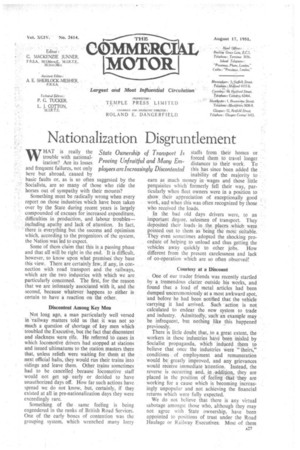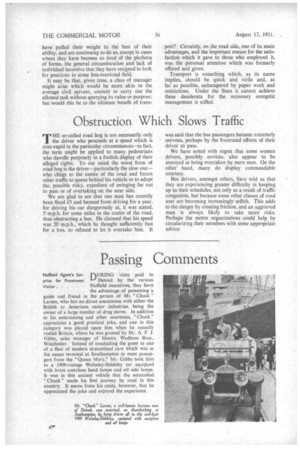Nationalization Disgruntlement
Page 29

Page 30

If you've noticed an error in this article please click here to report it so we can fix it.
State Ownership of Transport Is Proving Unfruitful and Many Employees are Increasingly Discontented WHAT is really the trouble with national ization? Are its losses and frequent failures, not only here but abroad, caused by basic faults or, as is so often suggested by the Socialists, are so many of those who ride the horses out of sympathy with their mounts?
Something must be radically wrong when every report on those industries which have been taken over by the State during recent years is largely compounded of excuses for increased expenditure, difficulties in production, and labour, troubles— including apathy and lack of attention. In fact, there is everything but the success and optimism which, according to the progenitors of the system, the Nation was`led to expect.
Some of them claim that this is a passing phase and that all will be right in the end. It is difficult, however, to know upon what premise they base this view. There are certainly few, if any, in connection with road transport and the railways, which are the two industries with which we are _ particularly, concerned. The first, for the reason that we are intimately associated with it, and the second, because whatever happens to either is certain to have a reaction on the other.
Discontent Among Key Men Not long ago, a man particularly well versed in-s'Tailway matters told us that it was not so Much a question of shortage of key men which troubled the Executive, but the fact that discontent and slackness were rife. He referred to cases in which locomotive drivers had stopped at stations and issued ultimatums to the station masters there that, unless reliefs were waiting for them at the next official halts, they would run their trains into sidings and leave them. Other trains sometimes had to be cancelled because locomotive staff would not get up early or decided to have unauthorized days off. How far such actions have spread we do not know, but, certainly, if they existed at all in pre-nationalization days they were exceedingly rare.
Something of the same feeling is being engendered in the ranks of British Road Services. One of the early bones of contention was the grouping system, which wrenched many lorry staffs from their homes or forced them to travel longer distances to their work. To this has since been added the inability of the majority to earn as much money in wages and those little perquisites which formerly fell their way, particularly when fleet owners were in a position to show, their appreciation of exceptionally good work, and when this was often recognized by those who received the loads.
In the bad old days drivers were, to an important degree, salesmen of transport. They deposited their loads. in the places which were pointed_ out to them as being the most suitable. They even sometimes adopted the shocking procedure of helping to unload and thus getting the vehicles away quickly to other jobs. How different from the present carelessness and lack of co-operation which are so often observed!
Courtesy at a Discount One of our trader friends was recently startled by a tremendous clatter outside his works, and found that a load of metal articles had been dumped unceremoniously at a most awkward spot, -and before he had been notified that the vehicle carrying it had arrived. Such 'action is not calculated to endear the new system to trade and industry. Admittedly, such-an exartiple may be infrequent, but nothing like this happened previously.
There is little doubt that, to a great extent, the workers in these industries have been Misled by Socialist propaganda, which induced them to believe that once the industries Were .44 theirs," conditions of employment and remuneration would be greatly improved, and any grievances would receive immediate attention. Instead, the reverse is occurring and in -addition, they are placed in the position of feeling that they are working for a cause which is becoming increas= ingly unpopular and not achieving the financial returns which were fully expected.
We do not believe that there is any virtual sabotage amongst those who, although they may not agree with State ownership, have been appointed to positions of trust under the Road Haulage or Railway Executives, Most of them have pulled their weight to the best of their ability, and are continuing to do so, except in cases where they have become so tired of the plethora of forms, the general circumlocution and lack of individual incentive that they have resigned to look for positions in some less-restricted field. It may be that, given time, a class of manager might arise which would be more akin to the average civil servant, content to carry out the alloued task without qtierying its value or purpose; but would this be to the ultimate benefit of trans port? Certainly, on the road side, one of its main advantages, and the important reason for the satisfaction which it gave to those who employed it, was the personal attention which was formerly offered and given.
Transport is something which, as its name implies, should be quick and virile and, as far as possible, unhampered by paper work and restrictions. Under the State it cannot achieve these desiderata for the necessary energetic management is stifled.




















































































